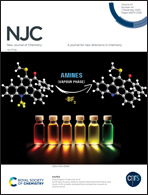Enzyme pretreatments for anaerobic co-digestion of food waste blended with bioplastics: effects on methane production and microbial community structure†
Abstract
Bioplastic bags mixed with food waste seem inevitable with the growth of waste classification and the banning of non-biodegradable polymers in China. To solve the asynchronous degradation of both food waste (FW) and bioplastics in the anaerobic digestion process, we investigated to determine the most effective pretreatment method. Among the three treatment options—physical, chemical, and biological—we found that biological pretreatment holds the most promise, primarily due to the efficient catalytic hydrolysis capacity of enzymes. We utilized three types of enzymes—amylases, lipases, and proteinase K—at a concentration of 0.075 g L−1 for pretreatment. The pretreatment process involved subjecting the FW/bioplastics mixture to enzymatic action for a duration of 48 h, at temperatures of 35 °C and 55 °C. We observed that the methane production from anaerobic digestion increased by 22.72%, 32.51%, and 60.95%, respectively, at the temperature of 55 °C when treated with the mentioned enzymes. Additionally, the degradation time of the bioplastic bags decreased from 30 to 24 days. Scanning electron microscopy (SEM) analysis revealed noticeable physical degradation, with the emergence of holes on the surface of the bioplastic following the enzymatic pretreatments and the effect of proteinase K was the most obvious. Further analysis using Fourier-transform infrared spectroscopy (FTIR) indicated that the peak observed at 1700 cm−1 is a characteristic peak of proteinase K depolymerization and the peak sign was significantly weakened after the experiment. This discovery suggests that proteinase K possesses a unique ability to break certain chemical bonds within bioplastics. Furthermore, novel bacterial species were identified in the substrate microbiome after proteinase K pretreatment. Notably, temperature was also a significant factor influencing material degradation. The enzymatic pretreatment enhanced biodegradation, resulting in enhanced methane yield during anaerobic digestion. These findings demonstrated the efficacy of biological pretreatment in effectively addressing the asynchronous degradation issue between food waste and bioplastics.



 Please wait while we load your content...
Please wait while we load your content...